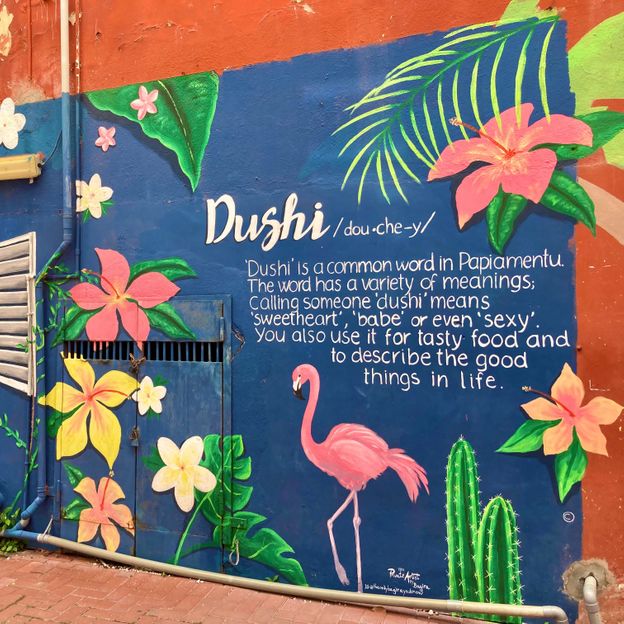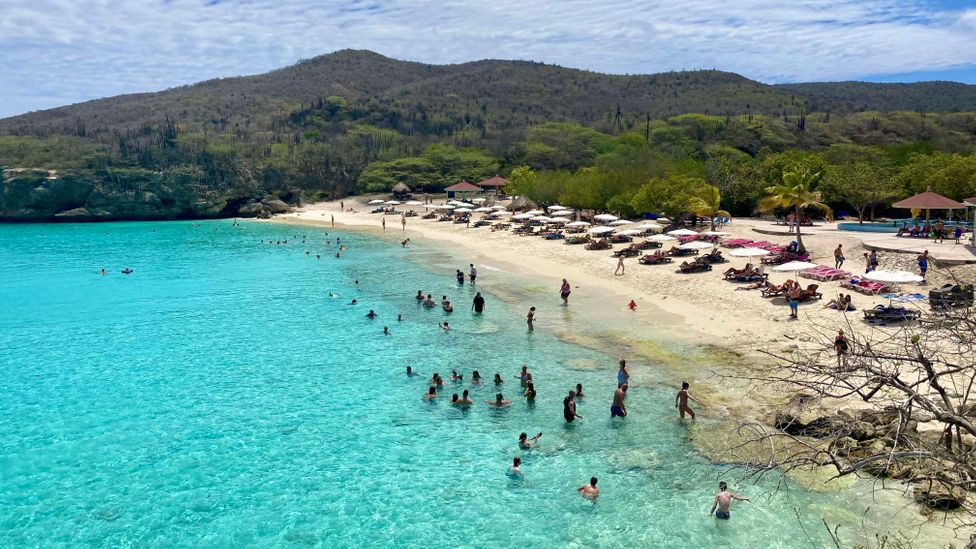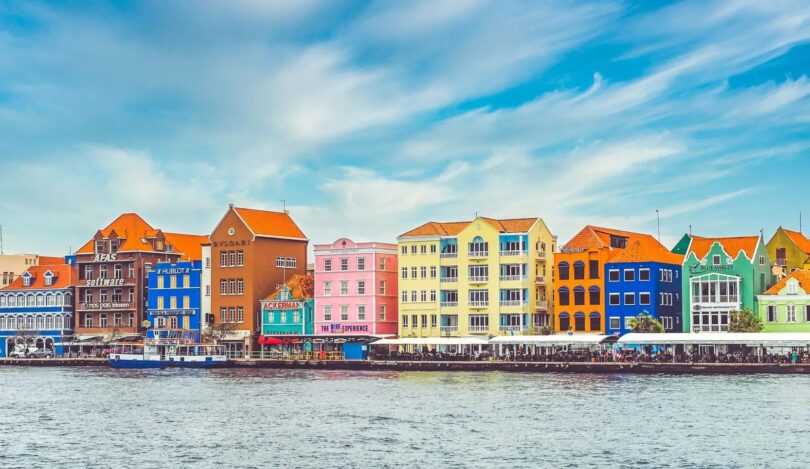Sarah Harvey
As I crunched my way through a bowl of funchi fries with hot pepper sauce at a cafe on the Dutch Caribbean island of Curacao, an exclamation from a neighbouring table caught my attention: “Dushi!”
The word emanated from a stylish young Curacaoan woman who was having lunch with a group of friends. I couldn’t make out the subject of the conversation, but with a soft “d” at the beginning of the word followed by a long cooing vowel and a melodious pitch rise at the end, I felt that dushi must mean something wonderful. After I left the cafe and began exploring the capital Willemstad, I realised the word “dushi”seemed to be on everyone’s lips.
Chefs boiling vats of goat stew at Plasa Bieu told me their kabritu stoba was the most “dushi”, while hipsters sipping cocktails made with bitter blue Curacao liqueur assured me that Pietermaai was the most “dushi” nightlife district on the island. According to my quick Google search, dushi means “sweet”, “tasty” and “sweetheart”, but I soon learned that it encapsulates so much more. Dushi is not only a mellifluous adjective or noun, itis a uniquely Curacaoan philosophy of recognising the sweetness in things that sums up the island’s identity in just one word.
Dushi is a uniquely Curacaoan philosophy of recognising the sweetness in all things (Credit: Sarah Harvey)
“Dushi is to me the most beautiful side of things, like the part in the movie that everyone is waiting for, or the part in the book where it all makes sense,” said Curacaoan artist Francis Sling, whose vibrant portraits and murals depict life on the island. “Before I opened my gallery, I studied and lived in Holland, and one of the reasons I came back is because of the dushi feeling here in Curacao. We have our own particular way of doing things. Maybe it’s because of the sun; we’re not in a hurry, we don’t have too many rules, and I like it like that – the dushi life.”
Dushi is to me the most beautiful side of things, like the part in the movie that everyone is waiting for, or the part in the book where it all makes sense
In its simplest form, the noun dushiis a term of endearment that can be used with anyone, from family members to strangers. But dushi can also be an adjective to describe a delicious meal, a great night out, someone you think is attractive, or an infinite number of things that you deem to be nice, lovely, wonderful, good or appealing.
“We use this word to express a lot of feelings, and it plays a big role in our daily vocabulary,” explained Mark Nooren, general manager of Curacao Marriott Beach Resort, noting that dushi is part of the Curacaoan cultural identity. “For example, we wish our guests a dushi experience with us. You can say ‘E kuminda ta dushi‘, which means the food is delicious. However, you can also say, ‘Tin un dushi dia‘, which is when you wish someone a good day. Or you can call someone ‘dushi’, which is basically the same as calling them ‘honey.'” He added: “I was amazed that just one word can be used to express different feelings.”
Nooren said that he sees this philosophy play out in everyday life, with its positive and kind outlook spreading happiness around Curacao. “Dushi is more than just a word, it’s a feeling. On the island, you can definitely feel the dushi in the people. They exude dushi in the way they treat people and their gentle smiles.”
When I first heard the word, it struck me that it didn’t sound Dutch even though Curacao has been linked with the Netherlands for almost 400 years. It turns out the word dushi is Papiamentu, the Creole language spoken by more than 80% of Curacaoans at home and one of the three official languages here, along with Dutch and English.
Although Curacao today is a constituent country within the Kingdom of the Netherlands, the island was originally settled by the Arawak Amerindians from the South American mainland 6,000 years ago. It was colonised by the Spanish in 1499, who deported the entire local population of Curacao in 1515, enslaving them in mines in Hispaniola in the Greater Antilles. This left no indigenous people in Curacao and was one of the darkest periods in the island’s history. Curacao was later seized by the Dutch West Indies Company in 1634.
The word “dushi” is Papiamentu, a Portuguese-based creole language spoken in the Dutch Caribbean (Credit: Sarah Harvey)
According to Curacaoan linguist Marta Dijkhoff, Papiamentu evolved from an Afro-Portuguese pidgin language used between enslaved people and the Dutch and Spanish colonisers of Curacao. (Although Curacao was never colonised by the Portuguese, Portugal launched the Atlantic slave trade, so Portuguese pidgin was one of the earliest forms of pidgin.)
But Papiamentu words also originate from a second, very different, source – one that helped transform it from a low-status language eventually into one spoken by people of all social classes. That was a large community of Jews that fled from persecution in Europe to Brazil, then were later expelled from Brazil by the Portuguese before finally settling in Dutch-ruled Curacao in 1651.
“Papiamentu became the language used between the Jews and the European community to communicate, and as such, it gained a higher status,” Dijkhoff explained. “And eventually, for the Jews, the Europeans, the blacks, the free and the non-free, Papiamentu became the main language of communication, rather than Dutch.”
Along the way, the word dushi became part of the lexicon. In fact, Dijkhoff told me, the earliest-known mention of the word appears in the oldest text in Curacaoan Papiamentu: a love letter written by a Jew to his “dushi” in 1775. In fact, the word dushi bears close resemblance to the Yiddish words “dushenyu” and “lyube-dushe” (meaning “beloved” or “darling”), as well as the Portuguese word for sweet (“doce“) – making it a true reflection of the various cultures that shaped Curaçao.
Playa Porto Mari, one of the most beautiful beaches in Curacao, embodies dushi (Credit: Sarah Harvey)
With a population was created by the mechanisms of slavery, colonialism and immigration, today, Curacao’s heritage is the result of more than 50 nationalities. While building a unified sense of national identity can be complex, one thing all Curacaoans can agree on is the significance of dushi in their cultural identity.
Dinah Veeris, a herbal healer in her 80s, has lived through Curacaoans gaining universal suffrage in 1949, the island transitioning from Dutch colony to self-governed territory in 1954, and residents voting in a referendum to become a constituent country within the Kingdom of the Netherlands in 2010. The elder told me dushi has always been part of Curacaoan life for as long as she can remember.
It’s one of the most beautiful words we have here on the island to talk to each other, to tell each other what they really mean to us
“Dushi is one of the first concepts that people get when they move here,” said Veeris. “It’s one of the most beautiful words we have here on the island to talk to each other, to tell each other what they really mean to us.
“Being from another place and hearing about dushi is beautiful. And when you hear the word all the time, it eventually becomes a part of you. As Curacaoans, we have made dushi the national character. We say it a lot – we even print it on shirts – and we have made it stronger.”
The thought of enslaved and persecuted people creating the word, claiming its power to enhance their happiness and making it part of their national character was fascinating to me. I reflected on my meeting with Dijkhoff where I’d learned about the roots of dushi. As we said goodbye, she’d mentioned that some members of the younger generation in The Netherlands have recently started using the word dushi as a slang term of endearment, and I couldn’t help but wonder if the world would be a kinder, happier place if we all adopted this sweet philosophy.
Courtesy: bbc







